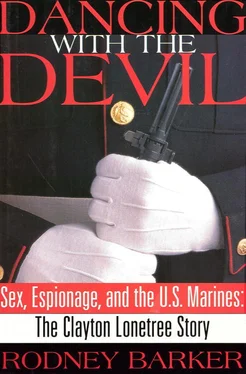After settling in, Henderson and Beck began a series of interviews, starting with the Marine detachment. And it didn’t take them long to recognize that a serious security problem existed at what was supposed to be America’s most sensitive diplomatic post. Marine after Marine complained to them about the difference between what had been drilled into them at MSG school, where they were told their job was to safeguard classified material and enforce security regulations, and the reality on post, where political officers not only exhibited a cavalier attitude toward security precautions, they resented it when the Marines tried to enforce them. Rather than being treated as an important part of the security apparatus, the Marines felt the State Department “elite” viewed them as members of the domestic staff.
This lax attitude toward security went beyond personnel to the technical, according to the Marines. Surveillance cameras to entrances didn’t work. Alarms to secure areas malfunctioned. Gates to the interior courtyard would stick in the up position. And when they brought these failings to the attention of the State Department’s security officer, nothing was done to remedy them.
Majors Henderson and Beck were appalled by what they heard, but it also answered a question both had come hoping to answer: How had Sergeant Lonetree been able to get away with it? How could this have gone on and no one known about it? It sounded now as though the State Department had tolerated gross deficiencies in its security programs with a complacency that was waiting for some external event to provide the impetus for attention.
At this point Henderson and Beck went in different directions. Major Henderson began to look for extenuating and mitigating circumstances that would impact the case against his client. While the State Department’s lax approach to security certainly set the stage, thinking as a defense counsel, Henderson realized it wasn’t going to help his case if it looked as though the Moscow detachment were made up of by-the-book Marines and his client were the only one to step out of line. That was not how Lonetree had described the situation, however, and as Henderson dug deeper, nor was that what he found. He heard about a hedonistic mood in embassy quarters and a tolerant attitude by superiors that created a climate of easy sex, lots of liquor, and black-market profiteering. Making things worse, he found, this misconduct had apparently been covered by a conspiracy of silence. Heads were frequently turned away from infractions, and sex with Soviets was winked at. For all practical purposes, he was told, the Marine detachment in Moscow functioned as if it were an isolated outpost, answerable only to itself. There was a we-look-out-for-ourselves mentality, reflected in the belief that the only news to get out of Moscow was what the detachment commander wanted the outside world to know.
Henderson’s conclusion was that while his client may have had his share of personal problems, he apparently wasn’t alone in violating many of the regulations. It was also evident that what had happened with Lonetree very probably could have been prevented had the people in charge not been so involved in their own personal adventures.
Major Beck, meanwhile, was being educated to a different set of embassy realities, which bore out the earlier warnings of the Justice Department. After determining there was no chance of interviewing Violetta—he was told that swallows usually fly off well before the trap is closed—he focused on meeting with intelligence officers. He was fully aware of the official position that the CIA did not maintain a presence in the embassy. Nonetheless, to complete the process of understanding the character and magnitude of Lonetree’s crimes, Beck felt he needed to know what impact his acts had had on the victimized Agency. It was going to be a significant part of his prosecution. Perhaps the most significant.
This was his thinking when he went to the regional security officer’s office in the American Embassy in Moscow and made what he considered to be a reasonable request. There were people he said he wanted to talk to. He wanted to meet with agents, officers in the field, who could say to him, Yes, I work for the Agency. This is what I do, this is how it is done, and this is why it is important to the interests and security of the United States. This is why my identity must be protected, and this is how it hurts when it is revealed.
He wanted as well for someone to say to him, Yes, we have undercover Russians, defectors, in place, who are channeling crucial intelligence data to the West. This is what they have done for us, and this is what happens if they become compromised.
Finally, he wanted to be told what adverse effects the Agency had seen, specifically those that were a direct result of what Lonetree had shown and told the Soviets. If Lonetree had indeed confirmed the identities of CIA agents to the Soviets and afterward the agents found themselves followed by spycatchers to drop zones or rendezvous sites, that was damage. If the Soviets took that information and used it to wipe out human intelligence assets in Russia, that was even worse damage. Beck wanted someone to tie those things to Lonetree for him, and he thought that if Lonetree had done what he said he’d done, the Agency should be able to determine that.
But Beck was given none of this. All he got were generalities and cleared quotes. Yes, Lonetree had the potential to do damage of that nature. Yes, certain things were probably compromised by the information he gave up. Yes, during the period in question we lost some people.
Beck was white-hot. He felt that his position as prosecutor, representing the United States of America in a trial in which it was alleged that espionage laws that protected intelligence officers had been violated, meant something. He felt that by its actions the CIA was saying he was not important enough to be trusted. In the entire time he was in Moscow, Major Beck was never introduced to a single person who acknowledged an affiliation with the CIA. He was never even told who the chief of station was. He would leave Moscow thinking he’d have had better luck if he’d asked one of the Marine security guards who the intelligence officers were.
But before Henderson and Beck left Moscow, a development would take place that would overwhelm these complaints. On March 21, the day before they were to depart for London, the regional security officer contacted Major Beck and indicated he had something important to impart to him. They rode the elevator up to the seventh floor, where they entered “the bubble”—a supposedly bug-proof room-within-a-room. There, the RSO said a top-secret cable had just come in from Washington, D.C., and he’d been instructed to share its contents.
Beck took the cable and read it. It said that a second Marine security guard by the name of Arnold Bracy had just signed a series of confessions to the NIS in which he admitted that he had conspired with Sergeant Lonetree to shut down alarm systems and allow KGB agents to conduct “moonlight tours” of the embassy. From this moment on, the memo indicated, the security of the ambassador’s office, the CIA station, the code room, even the bubble, should be considered compromised. If what Arnold Bracy said was true, every classified conversation and electronic communication to and from the embassy was being simultaneously piped to KGB headquarters at Dzerzhinsky Square.
When the story broke that a second Marine security guard had fallen prey to the seductive charms of a Soviet woman and the two had regularly teamed up to allow Soviet agents to conduct midnight house calls inside the secure spaces of the embassy, what had previously been viewed as a surprising but limited security breach escalated into what appeared to be the most serious espionage scandal in U.S. history. Once the outpost for scholarly diplomatic and military attachés who mingled with their Soviet counterparts and then sent back to Washington telegrams containing political, military, and economic analysis, the Moscow embassy had become a vital intelligence platform for the National Security Agency and the technical side of the CIA, bristling with listening devices and sensors and receivers that were capable of intercepting top-level Soviet conversations and communications. If Lonetree and Bracy were guilty as charged and Soviet agents had been given hours to roam inside the embassy, it was conceivable that these agents had successfully performed the equivalent of safe-cracking operations and had entered secure areas behind combination-locked doors where secrets were stored. There was no reason to doubt that the Soviets had successfully been able to install equipment that allowed them to intercept and read virtually all coded communications between the embassy and Washington since 1985, If that was the case, it was even possible they had been able to break U.S. codes elsewhere in the world.
Читать дальше












